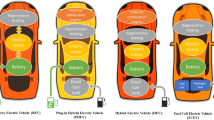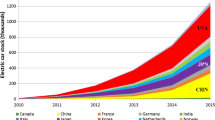Abstract
The application of optimization methods and algorithms to energy management is crucial when trying to find instantaneous compromises between various energy sources that can provide the power required by a powertrain. Because of the complexity of both the problem and the system structure, it is difficult to determine the optimal strategy in real time (on-line and using the onboard computer). This article tackles the problem of optimizing the power provided by various sources available to meet the power demand from the driver whilst minimizing the total hydrogen consumption during a journey. The real challenge is to find an energy management law applicable in real time on any power profile. This paper presents two new energy management methods: off-line “Dynamic Programming with Improved Constraints (DPIC)” and a real-time optimized decision-maker based on a two-levels optimized Fuzzy Logic (Fuzzy Switching of Fuzzy Rules—FSFR). DPIC produces better results than the classical discrete dynamic programming with state-of-the-art constraints, in terms of execution time and hydrogen consumption. FSFR is a real time energy management algorithm based on fuzzy rules learnt on specific profiles and real-time fuzzy switching of these fuzzy rules. Both methods are evaluated on different types of real world profiles (urban, road and highway profiles), to assess and confirm their effectiveness.














Similar content being viewed by others
References
Aso S, Kizaki M, Nonobe Y (2007) Development of fuel cell hybrid vehicles in TOYOTA. In: Power conversion, Conference-Nagoya, PCC’07, pp 1606–1611
Bonnans J, Guilbaud T, Ketfi-Cherif A, Von Wissel D, Sagastizábal C, Zidani H (2004) Parametric optimization of hybrid car engines. Optim Eng 5(4):395–415
Burke AF (2007) Batteries and ultracapacitors for electric, hybrid, and fuel cell vehicles. Proc IEEE 95(4):806–820
Caux S, Hankache W, Fadel M, Hissel D (2010a) On-line fuzzy energy management for hybrid fuel cell systems. Int J Hydrog Energy 35(5):2134–2143
Caux S, Hankache W, Fadel M, Hissel D (2010b) PEM fuel cell model suitable for energy optimization purposes. Energy Convers Manag 51(2):320–328
Chan CC (2002) The state of the art of electric and hybrid vehicles. Proc IEEE 90(2):247–275
Chan CC (2007) The state of the art of electric, hybrid, and fuel cell vehicles. Proc IEEE 95(4):704–718
Chau KT, Wong YS, Chan CC (1999) An overview of energy sources for electric vehicles. Energy Convers Manag 40(10):1021–1039
Cheng Y, Trigui R, Espanet C, Bouscayrol A, Cui S (2011) Specifications and design of a PM electric variable transmission for Toyota Prius II. IEEE Trans Veh Technol 60(9):4106–4114
Desai C, Williamson SS (2009) Comparative study of hybrid electric vehicle control strategies for improved drivetrain efficiency analysis. In: Electrical power & energy conference (EPEC), pp 1–6
Destraz B, Barrade P, Rufer A (2004) Power assistance for diesel-electric locomotives with supercapacitive energy storage. In: IEEE 35th Annual Power Electronics Specialists Conference PESC, vol 1, pp 677–682
Ellis MW, von Spakovsky MR, Nelson DJ (2001) Fuel cell systems: efficient, flexible energy conversion for the 21st century. Proc IEEE 89(12):1808–1818
Hankache W, Caux S, Fadel M, Hissel D (2008) Real time fuzzy energy management of fuel cell and ultracapacitor powertrains. In: Fundamentals and developments of fuel cell (FDFC), Nancy, France
Hofman T, Steinbuch M, van Druten R, Serrarens A (2007) Rule-based energy management strategies for hybrid vehicles. Int J Electr Hybrid Veh 1(1):71–94
Koot M, Kessels J, deJager B, Heemels W, vandenBosch P, Steinbuch M (2005) Energy management strategies for vehicular electric power systems. IEEE Trans Veh Technol 54(3):771–782
Lin C, Peng H, Grizzle J, Kang J (2003) Power management strategy for a parallel hybrid electric truck. IEEE Trans Control Syst Technol 11(6):839–849
Lombardi G, Mengali G, Beux F (2006) A hybrid genetic based optimization procedure for aircraft conceptual analysis. Optim Eng 7(2):151–171
Lu R, Zhu C, Tian L, Wang Q (2007) Super-capacitor stacks management system with dynamic equalization techniques. IEEE Trans Magn 43(1):254–258
Malaize J, Tona P (2011) Optimization-based control design for hybrid energy storage systems in electric vehicles. In: IEEE Vehicle power and propulsion conference (VPPC), pp 1–7
Neffati A, Caux S, Fadel M (2011) Local versus global optimization in multi source energy management. In: Fundamentals and developments of fuel cell (Conference–FDFC), Grenoble, France
O’Keefe M, Markel A (2006) Dynamic programming applied to investigate energy management strategies for a plug-in hev. Tech Rep, National Renewable Energy Laboratory
Rajashekara K (2005) Hybrid fuel-cell strategies for clean power generation. IEEE Trans Ind Appl 41(3):682–689
Rousseau G, Sinoquet D, Sciarretta A, Milhau Y (2008) Design optimization and optimal control for hybrid vehicles. In: International conference on engineering optimization (EngOpt), Rio de Janeiro, Brazil
Serrao L, Onori S, Rizzoni G (2011) A comparative analysis of energy management strategies for hybrid electric vehicles. J Dyn Syst Measur Control 133(3)
Sinoquet D, Rousseau G, Milhau Y (2009) Design optimization and optimal control for hybrid vehicles. Optim Eng 12(1–2):199–213
Su W, Rahimi Eichi H, Zeng W, Chow M (2011) A survey on the electrification of transportation in a smart grid environment. IEEE Trans Indust Inf 99
Tallner C, Lannetoft S (2005) Batteries or supercapacitors as energy storage in HEVs?
Thounthong P, Raël S, Davat B, Sadli I (2006) A control strategy of fuel cell/battery hybrid power source for electric vehicle applications. In: 37th IEEE Power electronics specialists conference (PESC), pp 1–7
Wang L, Li H (2010) Maximum fuel economy-oriented power management design for a fuel cell vehicle using battery and ultracapacitor. IEEE Trans Ind Appl 46(3):1011–1020
Won J, Langari R, Ehsani M (2005) An energy management and charge sustaining strategy for a parallel hybrid vehicle with CVT. IEEE Trans Control Syst Technol 13(2):313–320
Yu YB, Wang QN, Min HT, Wang PY, Hao CG (2009) Control strategy optimization using dynamic programming method for synergic electric system on hybrid electric vehicle. Nat Sci 1(3):222–228
Author information
Authors and Affiliations
Corresponding author
Rights and permissions
About this article
Cite this article
Guemri, M., Neffati, A., Caux, S. et al. Management of distributed power in hybrid vehicles based on D.P. or Fuzzy Logic. Optim Eng 15, 993–1012 (2014). https://doi.org/10.1007/s11081-013-9235-5
Received:
Accepted:
Published:
Issue Date:
DOI: https://doi.org/10.1007/s11081-013-9235-5




